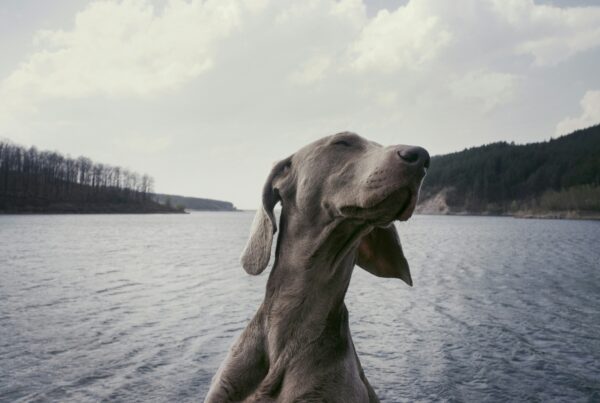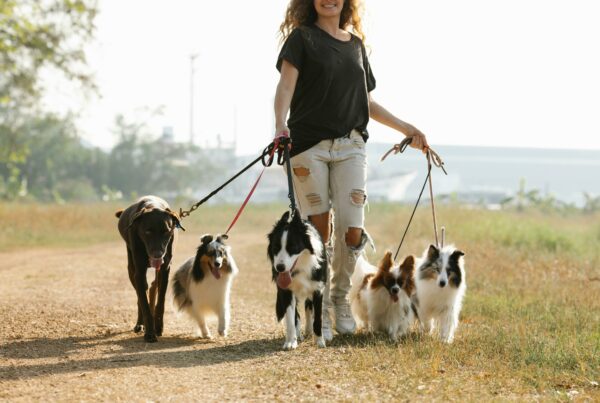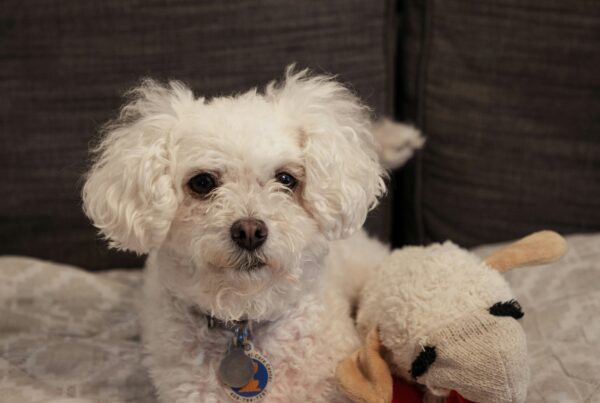Chances are good that the first night your puppy is in his new home, both of you will get little sleep. You can hardly blame your puppy for having difficulty sleeping. Dogs are creatures of habit and routine. Your puppy will miss his mother and littermates and will feel uncomfortable in his new surroundings until he forms a bond with you. Like a young child, your puppy has little control over his emotions and even though he may cry, scolding him will do nothing but cause him to fear you. If your puppy cries for you to come to him for the first few nights, your constant appearance, whether to comfort or scold, will only serve to reinforce the fact that he can make you appear with his cries.
It is important that your pup has a safe place to sleep, free from drafts and harm. Many owners have their puppy asleep in an exercise pen, and although this can be a good choice, many puppies settle down quicker and sleep more soundly when they are snug and warm in a crate. Once your pup is older, out of the chewing stage, and completely housebroken, chances are that he will rarely use a crate except to travel.
If you can’t bear to hear your puppy cry throughout the night, you might want to take the soft-hearted approach and place his crate next to your bed. There, he will know that you are near, and you can place your fingers into the crate and soothe him if he whines during the night. Most puppies will quickly go to sleep; however, some determined pups might refuse to settle down. If you become very irritated with your pup, place the crate in a separate room in your home and leave the puppy there for the night with a small amount of food and a little water. Never hit your puppy for crying.
Here are a few puppy care tips that may help your puppy feel more comfortable during his first night. When you arrange to pick up your puppy, ask the breeder for a soft toy or cloth that was with the puppy’s mother and littermates, and place it in his sleeping quarters. The familiar smell can be comforting to the pup. You can also leave a dim night-light on so the pup can see his bowl if he becomes hungry or thirsty. (Be sure not to leave too much food or water overnight, or the pup will probably awake because he has to potty.)
If your pup is having trouble sleeping soundly in his crate, place a sheet over the front door of the crate. Leave the side air holes uncovered. The pup will soon learn that when the door is covered, it is time to sleep for the night. If your puppy sleeps in the same area as another dog, he will settle down much quicker, taking his cue from his new friend.
Some people choose to allow their pups to sleep in bed with them. Remember, this will quickly become a habit that will be difficult to break later. If you allow you puppy to sleep in bed with you, make sure that this is something you want to continue when the pup is fully grown. It is easier to train a young pup, than to retrain a grown adult dog.
Protecting Your Puppy
Puppies will get into as much mischief as you allow. They are inherently curious and extremely determined once they have put their mind to something. Your puppy will need a safe place of his own to explore and play during the day when he is not with you. This area should be in a location that is near you so the puppy can observe the household activities going on around him. An easy-to-clean flooring such as vinyl or ceramic tile is a must until he is fully housebroken.
Just as a human child will pick up objects and put them in his mouth, so will a puppy. Be sure that any item that is small enough to choke on, or can be chewed into smaller pieces and swallowed, is out of the puppy’s reach. Electrical wires, curtain cords and poisonous houseplants are tempting to little puppies as well. Watch your pup carefully – he’s depending on you!
When your pup is outside, he will need a securely fenced yard, shade, and ample water. Never leave your pup alone outside for long periods of time. He may become too hot or cold, or he may find a way to escape out of the yard. He will also learn bad habits such as barking and digging, and will become lonely and more difficult to train. Your puppy wants to be a member of your family, and the more time you spend with him, the quicker he will become trained. Responsible puppy care begins with you!
This article was taken from http://www.dog-breeds.net/New_Puppy_Care.htm and modified by New York Dog Nanny.



